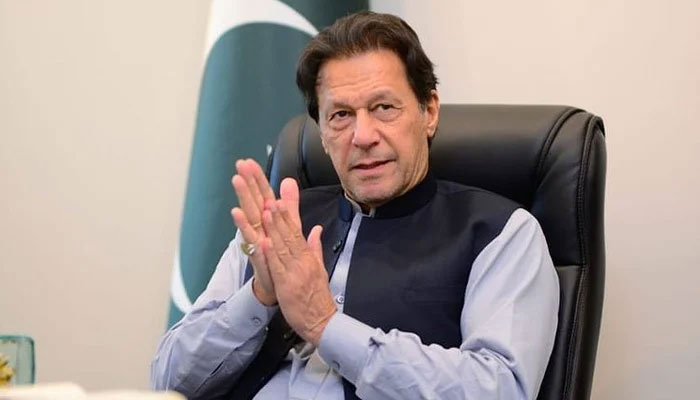News Analysis: What is PTI’s defence in assets hiding case against Imran?
KARACHI: The PTI legal team has two main planks of defence in the false declaration of assets case in which PTI Chairman Imran Khan is set to make his first personal appearance today in a district and sessions court in Islamabad.
Legal experts say that the defence put up by the PTI team can be termed a defence on technicalities -- as opposed to defence on merits. The technicality being used by the PTI counsel is that under Section 137 of the Election Act, 2017 criminal action on the Statement of Assets and Liabilities that Imran was supposed to submit is to be initiated within a period of 120 days from the date the statement of assets and liabilities has been filed. The PTI legal team’s argument is that the statute of limitation for the filing of criminal proceedings had passed.
The second plank the PTI legal team has focused on is that the district election commissioner -- who is the complainant in the trial court case -- has no authority to file complaint from the ECP and that there is no authority letter annexed with the complaint [filed in the court]. The EC’s counsel during the hearings said the commissioner was authorized to file the criminal complaint.
By most accounts, the legal battleground for the trial court hearing will likely be the first plank of defence by the PTI team -- the statute of limitations argument.
The district and sessions court was moved for criminal proceedings against Imran Khan by the ECP after its verdict that had found Imran to have engaged in “corrupt acts” -- under Sections 167 and 173 of the Elections Act of 2017 -- by making false declarations. Legal experts also point out that today’s hearing in effect has little to do with the ‘Toshakhana’ tag and is a case of ‘corrupt practices’ -- of hiding assets. In Imran’s case, those assets happen to be those he got from the Toshakhana. Lawyers say that once an asset has been obtained -- paying whatever amount -- that asset becomes the property of a person and counts in one’s assets and liabilities. As such, all these assets need to be declared.
-
 'Elderly' Nanny Arrested By ICE Outside Employer's Home, Freed After Judge's Order
'Elderly' Nanny Arrested By ICE Outside Employer's Home, Freed After Judge's Order -
 Keke Palmer On Managing Growing Career With 2-year-old Son: 'It's A Lot'
Keke Palmer On Managing Growing Career With 2-year-old Son: 'It's A Lot' -
 Key Details From Germany's Multimillion-euro Heist Revealed
Key Details From Germany's Multimillion-euro Heist Revealed -
 David E. Kelley Breaks Vow To Cast Wife Michelle Pfeiffer In 'Margo's Got Money Troubles'
David E. Kelley Breaks Vow To Cast Wife Michelle Pfeiffer In 'Margo's Got Money Troubles' -
 AI-powered Police Robots To Fight Crime By 2028: Report
AI-powered Police Robots To Fight Crime By 2028: Report -
 Everything We Know About Jessie J's Breast Cancer Journey
Everything We Know About Jessie J's Breast Cancer Journey -
 Winter Olympics 2026: What To Watch In Men’s Hockey Today
Winter Olympics 2026: What To Watch In Men’s Hockey Today -
 Winnie Harlow Breaks Vitiligo Stereotypes: 'I'm Not A Sufferer'
Winnie Harlow Breaks Vitiligo Stereotypes: 'I'm Not A Sufferer' -
 Apple Martin Opens Up About Getting 'crazy' Lip Filler
Apple Martin Opens Up About Getting 'crazy' Lip Filler -
 Why Did OpenAI Remove One Crucial Word From Its Mission Statement?
Why Did OpenAI Remove One Crucial Word From Its Mission Statement? -
 Prince William Warned His Future Reign Will Be Affected By Andrew Scandal
Prince William Warned His Future Reign Will Be Affected By Andrew Scandal -
 Amy Madigan Reflects On Husband Ed Harris' Support After Oscar Nomination
Amy Madigan Reflects On Husband Ed Harris' Support After Oscar Nomination -
 Is Studying Medicine Useless? Elon Musk’s Claim That AI Will Outperform Surgeons Sparks Debate
Is Studying Medicine Useless? Elon Musk’s Claim That AI Will Outperform Surgeons Sparks Debate -
 Margot Robbie Gushes Over 'Wuthering Heights' Director: 'I'd Follow Her Anywhere'
Margot Robbie Gushes Over 'Wuthering Heights' Director: 'I'd Follow Her Anywhere' -
 'The Muppet Show' Star Miss Piggy Gives Fans THIS Advice
'The Muppet Show' Star Miss Piggy Gives Fans THIS Advice -
 Sarah Ferguson Concerned For Princess Eugenie, Beatrice Amid Epstein Scandal
Sarah Ferguson Concerned For Princess Eugenie, Beatrice Amid Epstein Scandal




